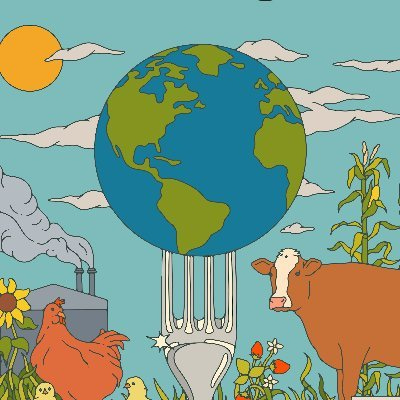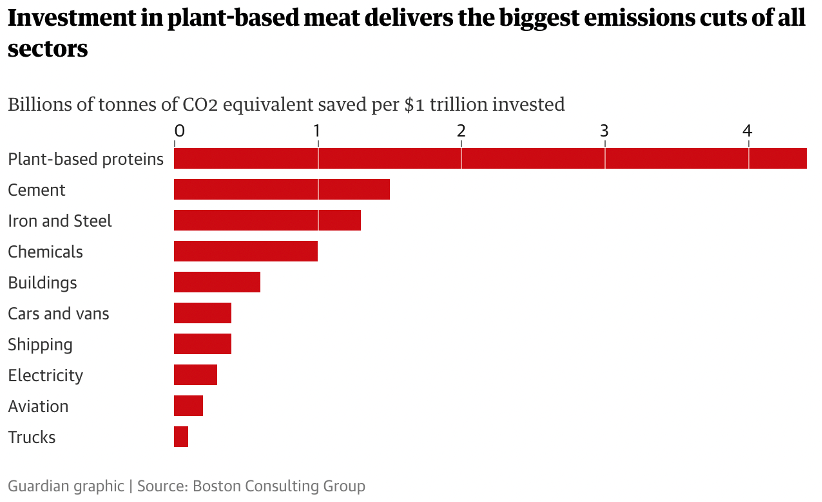Climate change is one of the biggest threats facing our planet today. With greenhouse gas emissions continuing to rise, it is imperative that we find innovative solutions to reduce emissions and mitigate the impacts of climate change. One promising solution is the development of alternative proteins, which could offer a significant and untapped opportunity for climate financing.
Alternative proteins, which include plant-based proteins, cultured meat, and fermentation based have the potential to reduce greenhouse gas emissions from animal agriculture drastically. Animal agriculture is responsible for a significant portion of global greenhouse gas emissions, with estimates ranging from 14.5% to 51% of all emissions. By developing alternative proteins, we could significantly reduce these emissions and help to mitigate the impacts of climate change.
The numbers speak for themselves. According to a report from RethinkX, a think tank focused on technology-driven disruption, alternative proteins could capture up to 10% of the global meat market by 2035. This shift would result in a reduction of up to 2.4 gigatons of greenhouse gas emissions annually, equivalent to taking 527 million cars off the road. Furthermore, the report suggests that this shift could save up to $1.4 trillion in environmental costs by 2050.

These numbers highlight the significant potential of alternative proteins as a climate financing opportunity. By investing in the development and scaling of alternative proteins, we could not only reduce greenhouse gas emissions but also create economic opportunities and contribute to sustainable development.
In addition to the environmental benefits, alternative proteins offer other potential advantages. Plant-based proteins, for example, can be produced with significantly less land, water, and other resources than traditional animal agriculture. This can help to reduce pressure on natural resources and promote more sustainable food production. Cultured meat, meanwhile, could offer a more humane and sustainable alternative to traditional meat production, potentially reducing animal suffering and improving animal welfare.
The shift to alternative beef, pork, chicken, and egg alternatives will save more than 1 gigaton (Gt) of CO2e by 2035—or about 0.85 Gt CO2e in 2030. This is equal to decarbonizing most of the aviation or shipping industries or about 22% of the building industry.
Producing animal alternatives emits 30% to 90% fewer GHGs than conventional meat, fish, dairy, and egg production.
Cultivated meat requires up to 78% less water than beef, and plant-based meat requires 99 percent less water than conventional meat.
We need to shift the narrative around food and sustainability. This means emphasizing the positive benefits of alternative proteins, including their potential to reduce greenhouse gas emissions and reduce/eliminate animal suffering, while also acknowledging the challenges and limitations of these technologies.
According to the BCG report, Food for Thought: The Protein Transformation:
Almost 30 million tons of bioreactor capacity for microorganisms and animal cells will also be needed in the base case, requiring up to $30 billion in investment capital.
The extrusion capacity needed for plant-based proteins will require up to $28 billion in investment.
Just alone in APAC (Asia-Pacific), according to a report published by the PwC, Rabobank, and Temasek - $750 billion in additional funding is needed by 2030 to meet the rising protein demands.
In conclusion, alternative proteins offer a significant and untapped climate financing opportunity. By investing in the development and scaling of these technologies, we can not only reduce greenhouse gas emissions and mitigate the impacts of climate change but also create economic opportunities and contribute to sustainable development. To fully realize the potential of alternative proteins, we need to address the challenges and limitations of these technologies and shift the narrative around food and sustainability toward a more positive and inclusive vision of the future.
Essential reference links
Dawn of the Climavores - https://www.kearney.com/consumer-retail/article/-/insights/dawn-of-the-climavores
Plant-based meat by far the best climate investment, report finds -https://www.theguardian.com/environment/2022/jul/07/plant-based-meat-by-far-the-best-climate-investment-report-finds
The Untapped Climate Opportunity in Alternative Proteins - https://www.bcg.com/publications/2022/combating-climate-crisis-with-alternative-protein
Food systems account for more than one-third of global greenhouse gas emissions - https://www.fao.org/news/story/en/item/1379373/icode/
Climate-friendly foods: are alternative proteins the way forward?- https://www.weforum.org/agenda/2022/07/protein-diet-vegan-climate-food-system-decarbonization
The Asia Food Challenge by Rabobank, Temasek, pwc - https://www.theasiafoodchallenge.com/
We are interested in ingredients and technologies that are superior, scalable, and sustainable that can make alternative proteins feasible, affordable, cleaner, and palatable. If you are an alternative protein startup, please apply for funding here 👉.
Or, get in touch to learn more about how you can participate in a greener future 👉
If you have not subscribed, please do subscribe to keep up to date with my musings on the venture ecosystem, impact investing, conscious capitalism, and fund management.




